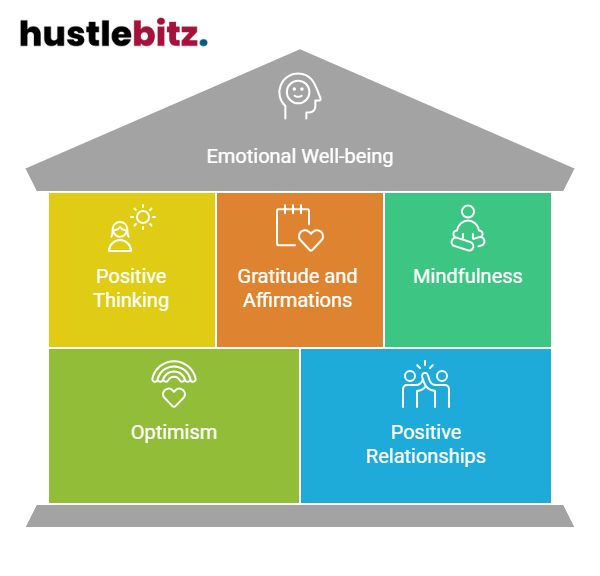Embracing positive thinking offers numerous mental health benefits, including reduced symptoms of anxiety and depression. This mindset fosters resilience, enabling individuals to navigate challenges with greater emotional strength. Techniques such as cognitive reframing, gratitude journaling, and positive affirmations help counter negative thoughts and build self-worth. Additionally, positive thinking enhances coping mechanisms and promotes better stress management by encouraging a more hopeful view of future situations. As a result, individuals experience improved emotional stability and healthier relationships. Discover the various strategies that can further enhance these benefits and support your mental well-being.
Key Takeaways
- Positive thinking reduces symptoms of anxiety and depression, promoting overall emotional well-being.
- Practices like gratitude journaling and positive affirmations enhance self-worth and resilience.
- Mindfulness techniques help regulate emotions and reduce negative thought patterns.
- Embracing an optimistic mindset fosters hope and strengthens coping mechanisms in challenging situations.
- Cultivating positive relationships provides essential emotional support and reduces feelings of isolation.

Understanding Positive Thinking
Positive thinking is the practice of focusing on favorable outcomes and cultivating an optimistic mindset, which can significantly enhance mental health and overall well-being. Understanding positive thinking involves recognizing its various strategies and techniques that can be applied in daily life.
For instance, cognitive reframing techniques enable individuals to shift their perspective on challenges, transforming negative thoughts into constructive ones. This shift fosters resilience and encourages a more hopeful outlook.
Additionally, the positive affirmations practice serves as a powerful tool for reinforcing self-worth and confidence. By regularly repeating affirming statements, individuals can challenge and diminish negative self-beliefs.
Visualization exercises also play a crucial role, allowing individuals to create mental images of desired outcomes, thereby motivating them to pursue their goals with increased determination.
Another effective method is gratitude journaling, which offers significant benefits by encouraging individuals to reflect on and appreciate the positive aspects of their lives. This practice not only enhances emotional well-being but also cultivates a mindset that recognizes abundance rather than scarcity.
Lastly, mindfulness meditation strategies contribute to positive thinking by fostering a greater awareness of present moments, helping individuals detach from negative thought patterns and develop a more balanced perspective.
Incorporating these techniques into daily routines can lead to a profound transformation in one’s mental framework, ultimately contributing to improved emotional resilience and a more optimistic approach to life’s challenges.
Impact on Mental Health

The impact of adopting a positive thinking mindset on mental health is profound, as it can lead to reduced symptoms of anxiety and depression while enhancing overall psychological resilience. Engaging in cognitive behavioral strategies allows individuals to challenge negative thoughts and replace them with more constructive beliefs. This shift not only improves mood but also fosters a sense of agency over one’s emotional well-being.
Furthermore, self-affirmation practices empower individuals to recognize their intrinsic worth, contributing to healthier self-perceptions. Gratitude journaling serves as a powerful tool for cultivating appreciation for life’s positives, effectively shifting focus away from stressors. Mindfulness techniques, such as meditation, help individuals remain present, reducing rumination and fostering emotional regulation.
The table below illustrates the emotional and mental health benefits associated with positive thinking practices:
| Positive Thinking Practice | Emotional Benefit | Mental Health Improvement |
| Cognitive Behavioral Techniques | Greater self-awareness | Enhanced coping strategies |
| Self-Affirmation Practices | Boosted self-esteem | Reduced feelings of worthlessness |
| Gratitude Journaling | Increased happiness | Lowered depressive symptoms |
| Mindfulness Techniques | Improved emotional balance | Enhanced focus and clarity |
Additionally, nurturing supportive relationships reinforces positive thinking. These connections provide emotional support, encourage open communication, and create a safe space for personal growth. Collectively, these practices empower individuals to cultivate a healthier mental state, underscoring the importance of positive thinking as a fundamental aspect of mental wellness.
Reduced Anxiety Levels

Adopting a positive thinking mindset significantly contributes to reduced anxiety levels by fostering a more optimistic perspective on life’s challenges. This proactive approach allows individuals to reframe their thoughts and view difficulties as opportunities for growth, ultimately diminishing feelings of fear and apprehension.
One effective strategy for cultivating a positive mindset involves mindfulness practices. By engaging in mindfulness, individuals learn to focus on the present moment, reducing the tendency to ruminate on past events or future uncertainties, which are often sources of anxiety.
Additionally, gratitude journaling can play a pivotal role in this process. By regularly acknowledging and writing down positive experiences or aspects of life, individuals can shift their focus away from negative thoughts, reinforcing a sense of contentment and reducing anxiety.
Affirmations usage is another beneficial technique. Positive affirmations help to challenge and counteract negative self-talk, fostering self-belief and resilience.
Visualization techniques can further enhance this process, as they allow individuals to mentally rehearse positive outcomes, thereby increasing their confidence in handling stressors.
Moreover, cultivating supportive relationships is crucial. Surrounding oneself with positive, encouraging individuals can provide emotional support and reduce feelings of isolation, which often exacerbate anxiety.
Together, these strategies create a holistic approach to mental well-being, empowering individuals to manage anxiety more effectively through the lens of positive thinking. By embracing these practices, the burdens of anxiety may become lighter, allowing for a more fulfilling and balanced life.
Lowered Depression Rates

Cultivating a mindset centered on optimism has been shown to significantly lower rates of depression by promoting resilience and enhancing emotional well-being. This shift in perspective can be achieved through various techniques, which not only foster an optimistic outlook but also empower individuals to manage negative thoughts effectively.
To illustrate the impact of positive thinking on depression, consider the following strategies:
- Cognitive Reframing: This technique encourages individuals to re-evaluate and reinterpret negative thoughts, transforming them into more constructive viewpoints. By changing the narrative surrounding distressing situations, individuals can alleviate feelings of hopelessness.
- Gratitude Practice: Regularly acknowledging and appreciating the positive aspects of life can cultivate a sense of fulfillment. This practice shifts focus from what is lacking to the abundance that exists, reducing depressive symptoms.
- Mindfulness Exercises: Engaging in mindfulness allows individuals to stay present and observe their thoughts without judgment. This awareness can help in recognizing negative thought patterns and fostering a more balanced emotional state.
In addition, self-affirmation techniques can reinforce one’s sense of self-worth, further mitigating feelings of inadequacy often associated with depression.
Enhanced Resilience

Enhanced resilience is a crucial benefit of positive thinking, enabling individuals to effectively navigate life’s challenges and recover from setbacks. By fostering an optimistic mindset, individuals can cultivate emotional strength that empowers them to face adversity head-on. This emotional fortitude is essential for developing adaptive strategies that promote recovery from difficult situations.
Positive thinking encourages a growth mindset, allowing individuals to view challenges as opportunities for learning and development. This perspective shift enhances cognitive flexibility, which enables individuals to adjust their thoughts and behaviors in response to changing circumstances. The ability to adapt is paramount in today’s fast-paced world, where resilience is increasingly tested.
To illustrate the relationship between positive thinking and resilience, consider the following table:
| Aspect | Impact of Positive Thinking |
| Emotional Strength | Builds a supportive inner dialogue |
| Optimistic Mindset | Encourages hope and future-oriented thinking |
| Adaptive Strategies | Promotes flexible problem-solving skills |
Improved Coping Mechanisms

The practice of positive thinking significantly bolsters individuals’ coping mechanisms, enabling them to manage stress and adversity more effectively.
By fostering a mindset oriented toward positivity, individuals can enhance their emotional regulation, allowing them to respond to challenges with greater stability and resilience.
This shift not only aids in navigating difficult situations but also promotes cognitive flexibility, enabling individuals to adapt their thoughts and behaviors in response to changing circumstances.
Three key strategies that illustrate the benefits of positive thinking include:
- Mindfulness Practices: Engaging in mindfulness helps individuals stay present, reducing anxiety about the future or ruminating on the past. This awareness fosters acceptance, aiding emotional regulation.
- Self Compassion Techniques: Embracing self-compassion allows individuals to treat themselves with kindness during challenging times, reducing self-criticism and promoting a nurturing internal dialogue.
- Social Support: Positive thinking encourages the cultivation of supportive relationships. By maintaining an optimistic outlook, individuals are more likely to seek and provide help within their social networks, enhancing overall well-being.
Better Stress Management
Positive thinking serves as a powerful tool for better stress management, equipping individuals with the mindset necessary to approach life’s challenges with greater calm and clarity. By cultivating a positive outlook, individuals can significantly mitigate the effects of stress, allowing them to respond more effectively to adversity.
Incorporating mindfulness practices into daily routines enhances this approach, fostering present-moment awareness that helps to reduce anxiety. Engaging in gratitude journaling further reinforces a positive mindset, as individuals reflect on and appreciate the positive aspects of their lives, shifting focus away from stressors.
Additionally, nurturing supportive relationships is crucial for managing stress. Surrounding oneself with positive influences provides emotional support, which can buffer against the pressures of life. The practice of self-compassion techniques also plays a vital role; by treating oneself with kindness during challenging times, individuals can reduce self-criticism and promote resilience.
Moreover, utilizing motivational affirmations can serve as a daily reminder of one’s strengths and capabilities. These affirmations help to create a self-affirming environment that counters negative thoughts and bolsters confidence in handling stressors.
Final Thoughts
Embracing positive thinking has a profound impact on mental health, offering tools to reduce anxiety, manage stress, and enhance overall emotional resilience. By incorporating practices like mindfulness, gratitude journaling, and affirmations, individuals can cultivate a more optimistic mindset, leading to improved coping mechanisms and better stress management. Positive thinking not only promotes emotional well-being but also fosters a sense of self-worth and strengthens relationships. By embracing these strategies, individuals can navigate life’s challenges with greater confidence and resilience, ultimately leading to a healthier, more balanced mental state.




